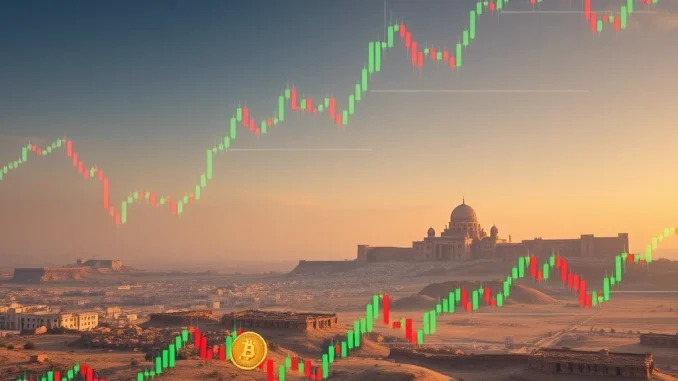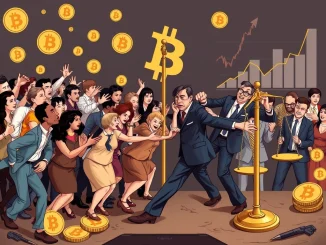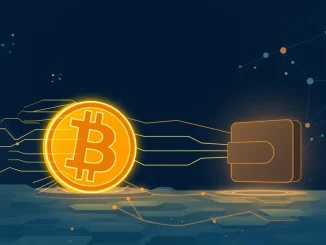
Global events can send ripples across financial markets, and for those navigating the world of cryptocurrency, understanding these connections is crucial. Recent developments involving Israel and Iran highlight significant geopolitical risk that demands attention. While the immediate focus is on the ground, the potential for wider conflict introduces uncertainty that can directly influence market sentiment and asset prices, including the bitcoin price.
Geopolitical Risk: Understanding the Latest Escalation
The situation in the Middle East has seen a concerning uptick in tension. Reports indicate Israel conducted a strike on Tehran’s symbolic Evin prison. This action reportedly followed the U.S. becoming more involved in the conflict dynamics.
Key points from recent reports include:
- Israel’s strike on Evin prison represents a significant escalation, targeting a highly symbolic location within Iran’s capital.
- The U.S. has reportedly engaged militarily, with bombers targeting underground nuclear sites in Iran.
- Former President Trump’s remarks have hinted at potential goals extending to regime change in Iran.
- Despite these intense actions and threats, Iran’s response has, so far, appeared measured compared to the scale of the strikes.
This sequence of events underscores the volatile nature of the region and the potential for rapid shifts in the geopolitical landscape.
Market Volatility: How Global Tensions React
Heightened geopolitical risk is a well-known catalyst for market volatility. When uncertainty rises, investors often move towards assets perceived as safer, while riskier assets may see sell-offs. This dynamic isn’t limited to traditional markets; the interconnectedness of the global financial system means that significant international events can also impact cryptocurrency markets.
Historically, periods of geopolitical tension have led to:
- Increases in the price of traditional safe havens like gold and certain government bonds.
- Volatility in oil prices due to concerns about supply disruptions, particularly in the Middle East.
- Sell-offs in stock markets as investor confidence wanes.
- Unpredictable reactions in the crypto market, sometimes following traditional risk-on/risk-off patterns, other times exhibiting uncorrelated behavior.
The current Iran conflict adds another layer of complexity to an already uncertain global economic outlook.
Bitcoin Price: Navigating Uncertainty
For cryptocurrency investors, the question arises: how does this escalating geopolitical risk affect the bitcoin price? The narrative around Bitcoin as a potential safe haven asset during times of economic or political instability has been debated for years.
Arguments for Bitcoin as a safe haven often point to its decentralized nature, limited supply, and independence from traditional financial systems controlled by governments. In theory, during conflict or currency devaluation, Bitcoin could serve as a store of value resistant to seizure or inflation.
However, Bitcoin also exhibits characteristics of a risk asset, often trading in correlation with technology stocks and reacting negatively to macroeconomic uncertainty or liquidity tightening. Its relatively short history compared to gold means its performance during prolonged, severe global conflicts is less proven.
During this specific Iran conflict development, observing how the bitcoin price reacts will provide further data points on its behavior in times of stress.
The Safe Haven Asset Debate: Gold vs. Bitcoin
When geopolitical risk increases, traditional investors often look to gold as the ultimate safe haven. Bitcoin has emerged as a potential digital alternative. How do they compare?
| Feature | Gold | Bitcoin |
|---|---|---|
| History as Safe Haven | Millennia | ~15 years |
| Physical vs. Digital | Physical | Digital |
| Centralization | Decentralized (physical commodity) | Decentralized (network) |
| Portability | Difficult (large amounts) | Easy (digital wallet) |
| Volatility | Relatively low | Relatively high |
| Government Control/Seizure | Possible (physical) | Difficult (private keys) |
While gold’s status is established, Bitcoin offers unique digital advantages. However, its price volatility remains a significant factor for those seeking stability during crises.
Actionable Insights for Investors
Navigating markets during periods of high geopolitical risk, such as the ongoing Iran conflict situation, requires careful consideration. While not financial advice, here are some general points to consider:
- Stay Informed: Monitor global events and understand their potential implications beyond the headlines.
- Assess Risk Tolerance: Understand how potential market volatility aligns with your personal investment goals and risk capacity.
- Consider Diversification: Diversifying across different asset classes may help mitigate risk during uncertain times.
- Long-Term Perspective: Avoid making impulsive decisions based on short-term news cycles. Focus on your long-term investment strategy.
- Understand Asset Behavior: Recognize that different assets, including Bitcoin, may react unpredictably to geopolitical events.
Summary: Geopolitical Risk and the Crypto Landscape
The escalating tensions involving Israel, Iran, and the U.S. serve as a stark reminder that geopolitical risk is a constant factor in global markets. While the immediate events focus on military actions and political rhetoric surrounding the Iran conflict, the potential for wider instability can significantly impact financial assets worldwide.
For the crypto community, this highlights the ongoing debate about Bitcoin’s role during crises. Will it act as a safe haven asset, or will it succumb to broader market volatility? The coming days and weeks, depending on how the situation unfolds, may provide further clarity. What is certain is that staying informed about global dynamics is essential for anyone navigating the complex and interconnected world of finance, including the evolving cryptocurrency market.



